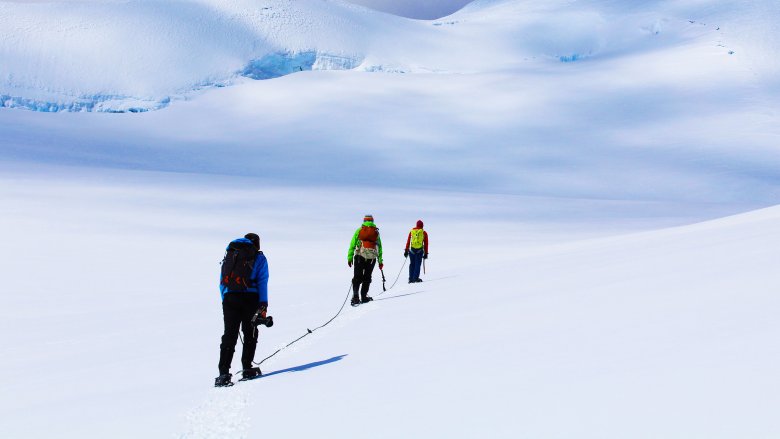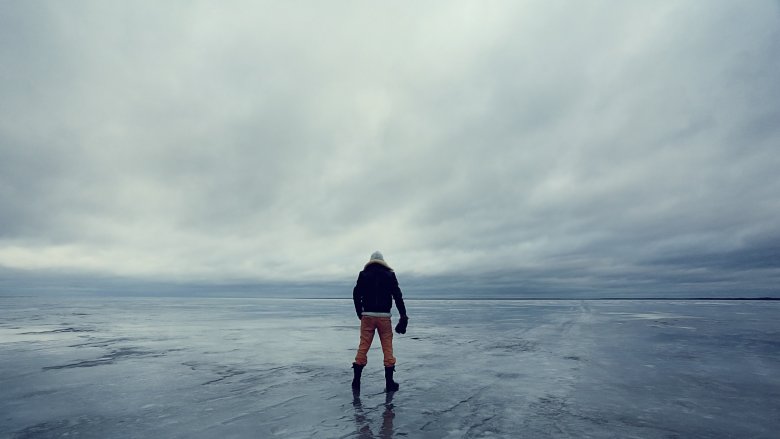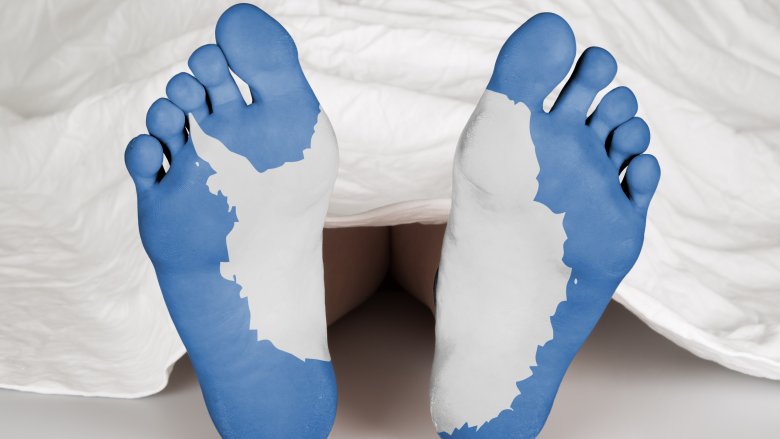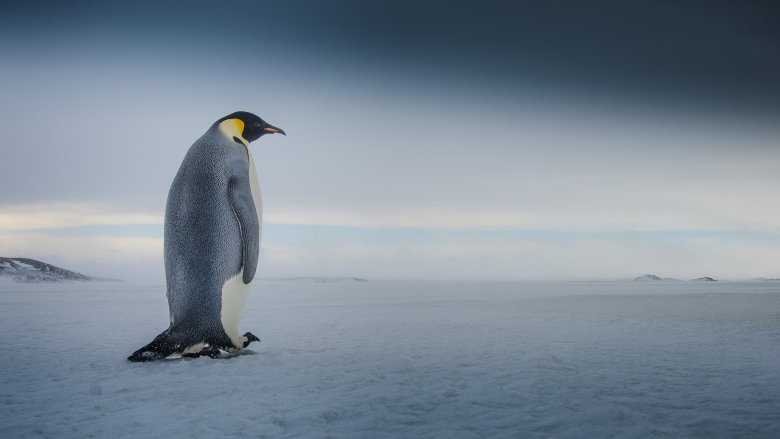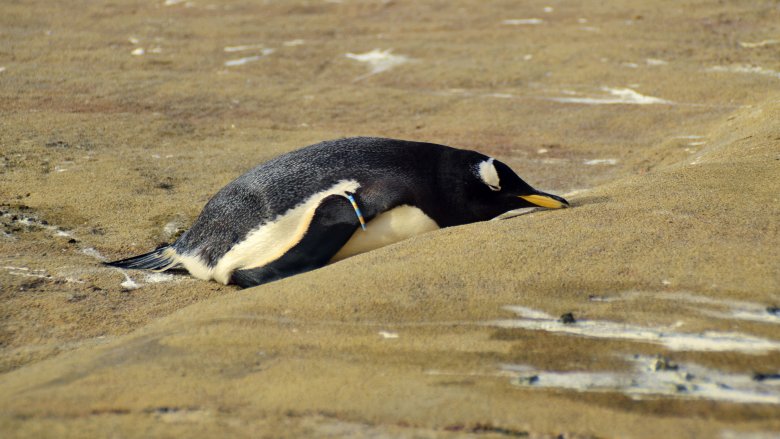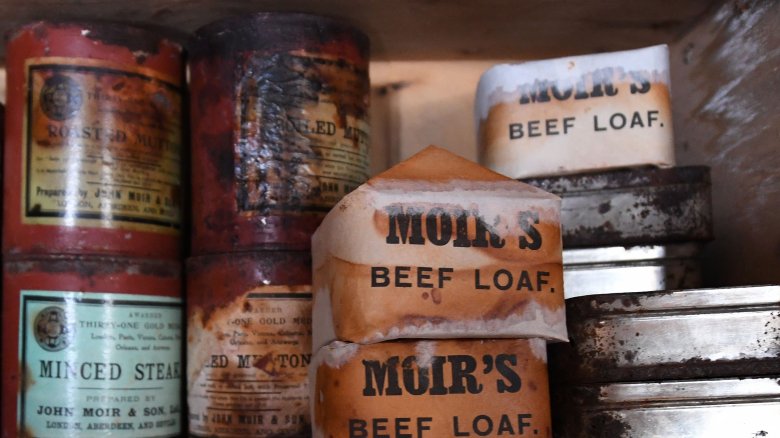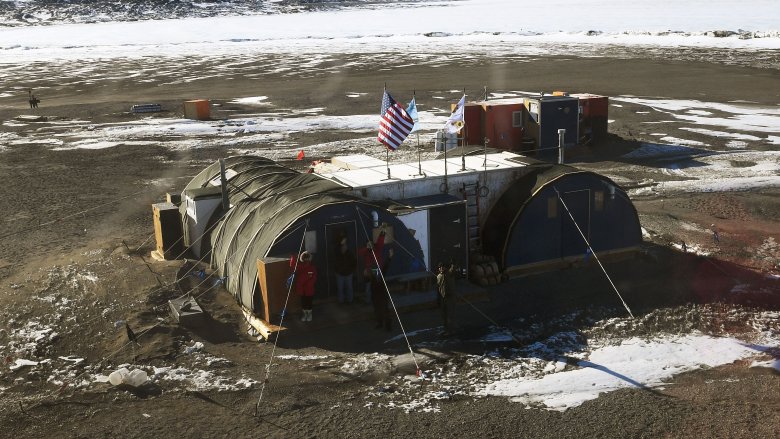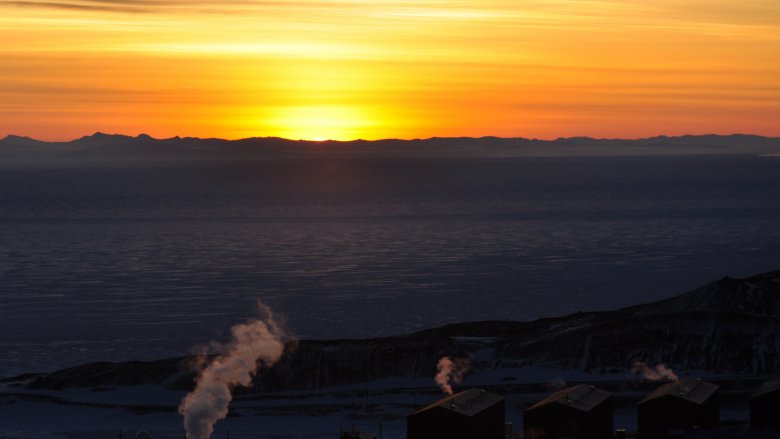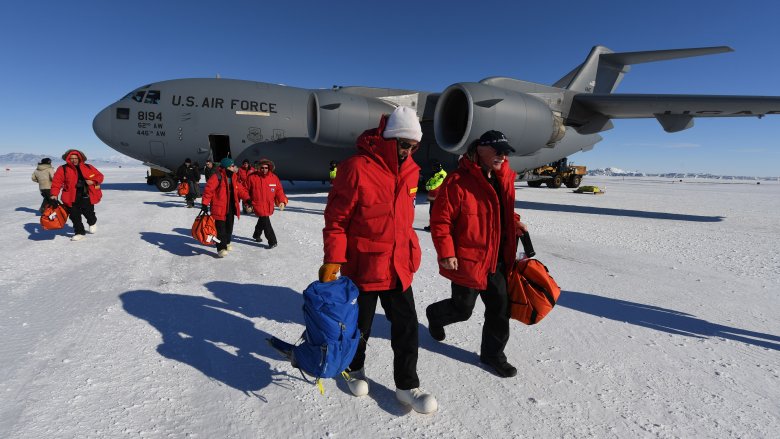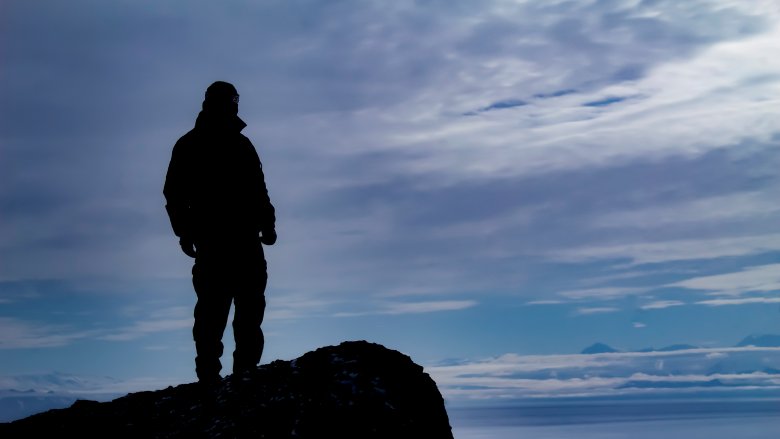The Dark, Disturbing Truth Of Working In Antarctica
At the very bottom of our planet lies the last true wilderness on Earth. It's the coldest, driest, windiest continent, a place so inhospitable to life it makes even New Jersey look livable. (Just kidding. Nothing makes New Jersey look livable.) Yet, despite this unremitting harshness, people still manage to make temporary homes there. According to the CIA's World Factbook, some 4,400 people work on Antarctica's 40 scientific bases in the summer, with a hardy 1,100 hanging on for the winter season. They choose to do this for their own unique, complex reasons, nearly all of which probably start and end with delirious fantasies of training a penguin to be their own private butler.
Yet life in Antarctica, even in the plush research stations owned by the U.S., is about as far from penguin-pampered comfort as you're likely to get. We don't just mean where the extreme cold or relentless high altitude is concerned. If you're going to Antarctica, you probably expect all that. No, the real dark part of life on the southern continent involves stuff that's never even crossed your mind. We're not saying not to go. We're just saying be prepared for some seriously messed up stuff.
The stress can literally drive you insane
In the depths of winter, there's nowhere on Earth you'd less like to be than Antarctica. Nope, not even Atlantic City. Winter in Antarctica is cold, with temperatures at McMurdo Station hovering around -30° Fahrenheit. Near Russia's Vostok station, it's been known to hit a bone-cracking -128° Fahrenheit. It's also darker than a gritty Netflix Archie Comics reboot. While some stations get a couple of hours' sunlight each day, those closest to the pole sit in eternal night. They're totally cut off from the outside world, meaning you're basically in the plot of The Thing. Unsurprisingly, that translates into severe mental pressure.
Over the decades, these winters have sent a number of people mad. In 1996, the Associated Press reported on three cooks at McMurdo who blew off steam in a brawl so bad the FBI had to investigate. Other stories include an Australian staffer who had to be locked in a storage room all winter to stop him attacking his coworkers, an Argentinian doctor who burned his base down, and a Soviet station where a game of chess escalated into one man attacking another with an axe.
Those are just the headline incidents. Every year, there are smaller tales of drunken fistfights, brawls, and random stabbings. Yes, stabbings. In 2018, a Russian researcher stabbed his roomie after suffering an emotional breakdown (via the Guardian). If the guys who grew up on a diet of freezing winters and vodka can't hack Antarctic winter, what hope do you have?
If someone murders you, it might not ever be solved
In 2000, Australian astrophysicist Rodney Marks keeled over and died at the U.S.-administered Scott-Amundsen station, in New Zealand-claimed Antarctic territory. Thanks to the brutal weather, he was kept on ice for six months before being flown to New Zealand for a routine autopsy. Only his autopsy turned out to be not so routine. Stratospheric levels of methanol — a cleaning fluid — were found in his body. An inquest ruled out suicide, leading to an unsettling conclusion. Either Marks had been the victim of criminal negligence, or he'd been murdered (via the Guardian).
Given this was Antarctica's first suspected murder, you might think everyone went all out to find the culprit. You'd be wrong. From the beginning, the U.S. stonewalled New Zealand police inquiries, refusing to even confirm the identities of the 49 people who'd been on base with Marks. (Police eventually found them via an internet search.) They even stopped the police from questioning Marks' coworkers. The closest they could get was sending out a questionnaire. Only 13 people replied.
By 2006, New Zealand police were actively accusing the U.S. National Science Foundation and company Raytheon of hindering their investigation. The crux was the overlapping jurisdictions of an Australian citizen dying on New Zealand territory at a U.S. base. With each country looking to protect their own, Marks' death was never solved. In 2008, the coroner said foul play and suicide were both unlikely (via Australian Broadcasting Corporation), and it could have been an accident.
If you get injured, there's absolutely nowhere to go
Part of Antarctica's draw is that it's pristine. Aside from those ancient alien cities buried beneath the mountains of madness, there's nary a hint of civilization. Step off your base, aim in a random direction and start walking, and all you're guaranteed to eventually find is ice, penguins, and death. This is wonderful from the perspective of someone wanting to experience untouched wilderness, but significantly less wonderful from the perspective of someone in dire need of medical treatment. If you suffer serious illness or injury in Antarctica's remote, windswept plains, it could be months before anyone can help you.
That's not an exaggeration. Depending what time of year you hurt yourself, you could have to wait up to nine months to visit a hospital. While all Antarctic bases have a doctor and some, such as McMurdo Station — which is basically the Hilton of South Pole research stations — have proper medical facilities, there simply isn't enough space for stuff like emergency operating rooms or physiotherapy centers or ICUs. In 2011, the manager of the U.S.-administered Amundsen-Scott station suffered a stroke in August, at the height of Antarctic winter. Because of the extreme weather, she couldn't be evacuated until October (via Live Science).
Thanks to stringent safety procedures, bad accidents in Antarctica are thankfully rare. But just knowing how difficult it'd be to get help can itself be an issue. Vice reports that one of the biggest sources of anxiety for workers can be worrying about injury.
It's way more boring than you probably think
What's your mental picture of working in Antarctica? That it's basically like working at home, except you get to spend your lunch break cavorting with seals, right? Sadly, that's not even remotely close to the reality. While many working on base in Antarctica do spend their downtime visiting remote parts of the frozen continent, there are only so many trips you can realistically take. On home days, or just if you happen to be working over winter, the sad fact of Antarctic life is that it can be incredibly boring.
Canadian Geographic has the story. The trouble is that research stations are designed for efficiency and science, not frat parties and jumping club nights. That means all parts of them pretty much look the same. The outsides, too, are equally featureless. The area immediately around McMurdo Station looks like a Soviet mining town, while the Amundsen-Scott station is in the middle of an endless sea of white. Once you've gotten bored of thinking "dude, I'm in Antarctica!" your most realistic avenues for entertainment are watching DVDs, playing video games, and getting drunk. So basically things you do at home.
Once winter sets in, things get even worse. While some bases at least have gyms and saunas, others — such as France and Italy's Concordia Station — are so tiny there's nothing there. As few as 11 people might be living with you, which could either mean nine months of blossoming friendship and/or hanky panky, or nine months of weeping with boredom and all getting the flu at the same time.
The entire continent wants you dead
Even on a planet that gave birth to the unstoppable murder-nightmare of Australia, there's no other continent that so clearly wants humans dead as Antarctica. Even discounting the near -130° Fahrenheit temperatures and the 200 mph winds, the southern land is a place that should haunt the nightmares of any traveler. The simple fact is this is a place where nature will conspire to murder you.
Take crevasses. Sheer-sided gaps that suddenly open up in the ice, they can descend for hundreds of meters into the darkness below. They can appear almost anywhere. Snow frequently forms a thin layer over them, so it's all too easy to be driving along your dog sled one moment, admiring the landscape, and the next be lying in a mangled, bloodied heap at the bottom of a pit you'll never escape. As recently as 2016 a worker died falling into an Antarctic crevasse (via Australian Broadcasting Corporation).
As BBC Future explains, crevasses aren't the continent's only killers. Avalanches can sweep you away, sea ice can melt and leave you stranded, or you might simply slip on ice and die in the fall. That doesn't even include whiteouts, when a storm blows in suddenly and whips up so much snow you can't see or hear a thing. If that happens, you can get lost and die even if you're within a foot of safety (via American Museum of Natural History).
You're gonna be mostly living on freezer meals
Practically the only vegetation that can grown in Antarctica is lichen, also known as something not even a starving person would want to eat. Although some bases have hydroponics for growing a handful of fresh crops, it really is a handful. Most of the food in Antarctica has to be shipped or flown in from Argentina or New Zealand, often at great cost. As a result, most of it is tinned or frozen. That means any long stint on the southern continent is almost guaranteed to see you mostly living off premade meals.
In the summer, this can be a pain. The biggest bases (lookin' at you, McMurdo) get fresh food around once a week, depending on weather. In winter, it's simply impossible. Nothing comes into or goes out of Antarctica in winter, so all food has to be capable of being stored for six to nine months (via Slate). That means pizza, fried chicken, chocolate, and other stuff you'd normally associate with being broke and hungover. If you get a hankering for fish, eggs, vegetables, fruits, cheese, milk, juice, or anything else you might actually want to eat, bad luck.
Then there's alcohol. Ahh, alcohol! While some bases seriously encourage drinking, others like to leave you helpless and pining for beer's sweet release. One Australian station locks up everyone's booze in a closet known as Fort Knox.
There's basically no internet (unless it's for work)
With so much of the world connected to the internet, it's easy to forget that this magical wonderland of facts, Facebook, and racism (sometimes all at once) is only available thanks to whopping great undersea cables. Cables that it would be both suicidal and pointless to try laying all the way to Antarctica. The only way the southern continent gets internet is via satellite. That means that going online in the great white wilderness is both cripplingly expensive and cripplingly slow.
Internet time for nonessential work is strictly rationed in Antarctica. But that's okay because the connection is too slow to do anything in-depth anyway! There's no possibility of streaming Netflix, downloading a film, doing some online gaming, or getting addicted to YouTube. You can still send tweets and read around a little, but beyond that you're as internet poor as someone still living back in 1987.
An added problem with Antarctic life is that there's no moisture in the air, which means a lot of static electricity. That means any piece of electronic equipment you lay down on a surface without an anti-static mat stands a chance of being accidentally fried. While bases have anti-static mats, they tend to be reserved for people who need to do actual, important work, not look at pictures of their families.
Sensory deprivation can cause horrible physical problems
It sounds like a hippie New Age thing, but anyone who knows the human mind knows that sensory deprivation can be absolutely brutal. That's not normally much of a worry when you're, ya know, living a normal life, but when you're at the very bottom of the world, it can cause big trouble. That's because Antarctica, especially in the winter, can be a cold, dark world of nothingness, where the only stimulation your brain receives is trying to visualize the last time it received any stimulation. There's even a condition known alternately as "winter over syndrome" or "getting toasty" where isolation and lack of stimuli basically conspire to send you bonkers.
Vice has the details. The lack of things to see and people to meet can cause everything from sucky stuff like sluggishness and sleepiness, to really sucky stuff like memory loss and depression. Yep, being stuck on a boring base in Antarctica over winter can be like having a rancid hangover without any of the fun/danger of getting drunk.
Even if you avoid these brutal side effects, the experience of living away from the real world for a long period of time can lead to you forgetting how to function in society. Many people who spend a long time isolated in Antarctica find their social graces have slipped away by the time they return to society.
You're expected to work 'til you drop
Why do people choose to work in Antarctica? The pay reportedly isn't great, travel opportunities can be limited, and then there's everything else we've mentioned to worry about. Perhaps there's just a ton of free time to be had? Nope. Down on the ice you're expected to work your fingers off.
Working hours in Antarctica can be long and tough. Mostly that's to head off everyone going loco from boredom, but it still means that your time on base won't really be "your" time at all. Many contracts specify ten-hour days with unpaid overtime, six days a week, and some are even heavier schedules than that. Sure, that's not a problem if your job description is "super genius scientist working on a very important project that will change the world." But, if it's "dude who takes out the super genius scientist's trash" then it's probably not quite so great.
This brings us to the crux of the issue with working in Antarctica. Most of the jobs available aren't glamorous science positions or helicopter piloting. They're stuff like snow shoveler, general handyman, pot washer, IT support, and maintenance person. One guy who did grunt work in Antarctica later wrote a book about the experience called Big Dead Place. He described work that was so unrewarding and monotonous he often forget where he was, saying he "might as well have been in Nebraska." At least you can leave Nebraska.
It's super difficult to get a job there
There are two ways to get to Antarctica: go as a tourist or get a job. Tourism is expensive, which may be why many try for working there. But it's not just so simple as deciding one day "I'm gonna go to Antarctica!" and mailing off your resume to the South Pole. Getting the go-ahead to work in Antarctica — unless you have some specialized science or engineering skill — is almost as difficult as getting permission from NASA to go into space.
Because of the close quarters and intense nature of life at the pole, one of the first things you have to do to is pass a stringent psych evaluation. Vice calls the process "extremely competitive," as it's designed to filter out anyone going just for the adventure, or just because they like challenges, or just because they're young and stupid. (If you're under 25, you should probably forget about applying.) In fact, the biggest asset you can have for applying to work in Antarctica is to be a very solid, easygoing, kind of boring person.
Beyond that, you'll need a squeaky clean background and no health problems. The South Pole Neutrino Observatory describes what's required to work at the pole, and it involves passing drug tests, background checks, plus "rigorous physical and dental exams." Yep, even having bad teeth can sink your South Pole dreams.
